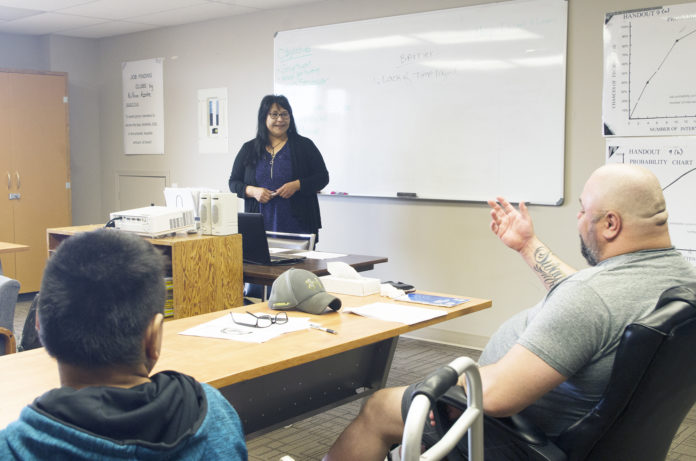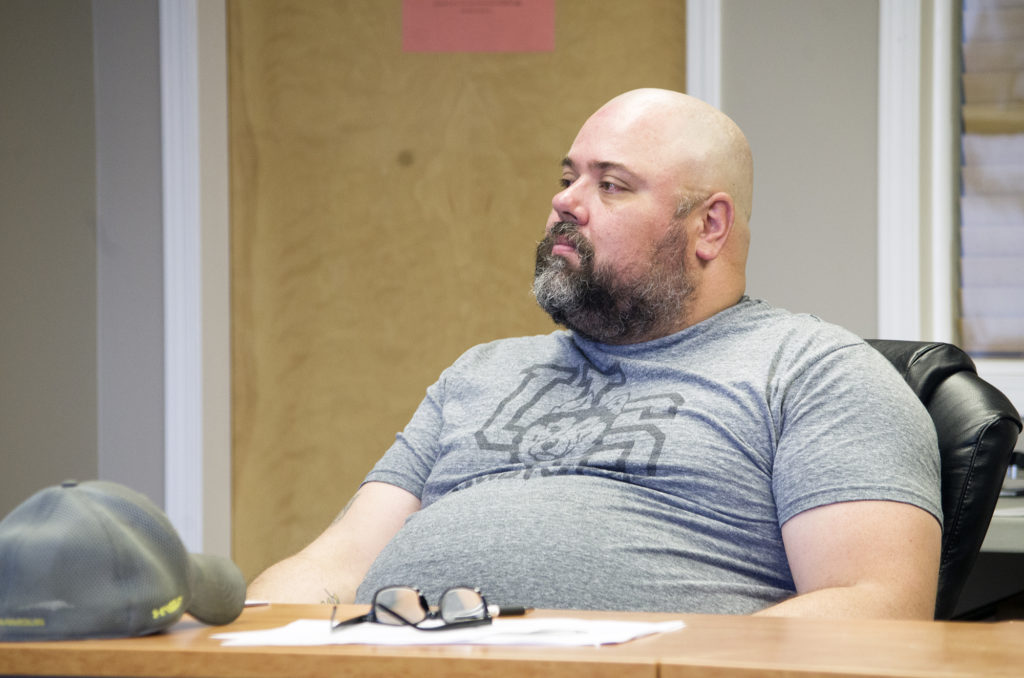
Vocational counselor Gladys Ledoux knows how her class feels.
On this windy summer day, Ledoux and four participants in the Prince Albert Job Finding Club are going over the top 10 reasons people have a hard time finding employment. Time management is the first item on the list, and as the wind howls outside the Prince Albert and District Community Service Centre (CSC), she lets the class in on her own personal experience. In this case, it’s not arriving too late. It’s arriving too early.
“I will arrive 15 to 20 minutes earlier than when I’m supposed to,” says Ledoux, one of several people who help oversee the Job Finding Club. “When I did that over the winter, I had to wait outside.”
“That happened to me yesterday,” a participant in a grey University of Saskatchewan t-shirt says. “I showed up early and I went to try the door, and I’m like, ‘man,’ and I looked and it’s 8:30.”
Time management isn’t a huge problem for the four Job Finding Club participants sitting around the table. In fact, many of them have successfully held down jobs before, only to end up out of the workforce for an extended period of time. Sometimes it’s personal reasons. Sometimes it’s medical reasons. Sometimes it’s the inability to adapt to changing technology. Regardless, the Job Finding Club covers all bases.
Ledoux says people who have searched for employment for lengthy periods will develop habits or patterns during the hunt. Some are helpful. Some aren’t. The goal of this conversation is to help identify which is which.
“One of our policies is ‘the doors have to be locked (until) a certain time,’ and I know a lot of organizations out there are like that too,” she explains during a class break. “Even though we don’t think about it, these are some barriers for people with disabilities, etc., so we’ve got to be aware and do some research.”
The Job Finding Club concept is new to Prince Albert, sort of. The Prince Albert Outreach program started it up in the 1980s, with support from the Canada Employment Centre and the federal government. However, the program was long dormant by the time the Prince Albert Community Service Centre thought about bringing it back four years ago.
“We did a program review and said, ‘okay, we believe in group processes,’” Community Service Centre CEO Bill Powalinsky remembers. “We do a bang-up job one-on-one … but the counseling staff that I have on board, and myself, have all got experience with group process and we know that groups are very effective. When you get the synergy of having people all pulling for one common outcome, it can be really, really powerful. It just became a case of tracking down a trainer.”
That plan became a reality in 2018, when 127 people completed the program. So far roughly 60 per cent have found a job. Powalinsky says that’s a great start, especially considering the current labour market conditions, but their goals are even higher.
This is the fourth Job Finding Club of 2019, with two more scheduled before the year is over. Ideally, the CSC would like to have 10 to 12 Job Finding Clubs a year, with 15-20 people attending each club, and an 85 per cent success rate. He expects they’ll need a few more community partners to make that happen, but that’s as a positive development, not a barrier.
“We’re not being protectionist,” Powalinsky says. “We feel that what we’ve got is a good thing and we want everybody to benefit from it.”
Starting from scratch
Job Finding Clubs first came to prominence in the early 1980s due to the work of American behavioral psychologist Dr. Nathan Azrin. Azrin built on ideas developed by B.F. Skinner, his mentor at Harvard, and put them to use in 1958 when he began working with mental health patients at Anna State Hospital in Illinois.
His ideas were sometimes controversial, and sometimes popular. Eventually, his theories about human behavior were put to use everywhere from military training, to couples relationship counseling to athletic coaching seminars.
“It would be difficult to name a population that wasn’t affected by his work—the young, the old, the professional athlete, the developmentally disable,” the New York Times quoted one of his colleagues as saying when Azrin died in 2013.
The ‘Job Club Counselor’s Manual,’ published in 1980, was one of his lesser-known works, but it still proved influential. It outlined how vocational counselors could use his ideas to help unemployed people find work. It helped give rise to the Job Clubs of the ‘80s, which gave rise to the Job Clubs of today. Every counselor involved in the Prince Albert Job Finding Club has been trained in the methodology.
“Client testimonials say it all,” Powalinsky says. “Folks have talked about how it’s opened their eyes to the job market and how they’ve gained the confidence and the skills necessary to look for work. For us, that’s really what we want to see: folks who are self-sufficient. They’ve gained skills. They’ve gained confidence. They’ve got the process and the tools.”
More than a week before the Job Club even starts, prospective participants sit down for a ‘pre-session.’ These sessions focus on basic things like updating resumes or writing cover letters.
When the program starts, the instructors get participants thinking about the basics—things like assessing their job skills and identifying future goals. From there, participants will begin building a job contact list. If they know of a potential job, they bring it to the group. The person bringing it back may not be interested or able to do the job, but someone in the group could.
Powalinsky estimates that around four per cent of all jobs are open, even though employers aren’t advertising for a replacement. This could be due to transfers, promotions, sickness or paternity and maternity leave. This is called the Hidden Job Market, and this is where the Job Find Club encourages participants to look.
“We help people strategically,” Powalinsky explains. “We point to specific jobs in specific sectors. Some people kind of take the shotgun approach. They’ll apply to anything and everything that comes their way and they’ll wait for the ads to show up, but what we really focus on is the hidden job market. That’s getting to the employer before they post it on Sask Jobs or post in in the paper or on paNOW or in Kijiji or LinkedIn.”
As employer contacts come in, Job Finding Clubs begin to refine their pitch. They work on interviews—both over the phone and in person—so when they do land one they can put their best foot forward. Interviews can be a major barrier for job hunters who otherwise have the necessary skills and the work ethic, but freeze up when it comes to formal conversations.
“(I want them) to believe in themselves, you know, find some skills and abilities that they didn’t really know existed,” Ledoux says shortly before heading back to class. “When they come through the program, they’re amazed at some of the self-exploration they do … and they build on it.”
Who is jobless?
There are plenty of stereotypes about jobless people, but those aren’t helpful to non-profits trying to match job seekers with prospective employers.
That frustration led two Brookings Institution researchers, Martha Ross and Natalie Holmes, to look into data from 130 U.S. cities to see what the average unemployed person is actually like. The verdict? There is no one single type. Instead, they found seven different clusters of people having a hard time finding work. Those groups include everything from seniors approaching retirement age, to first-generation immigrants struggling to learn English, to veterans leaving the armed forces and entering the job market for the first time. However, even with specific classifications, it’s still difficult to fit everyone neatly into a group.
For roughly 20 years, Rene Lavallee worked as an emergency medical dispatcher in Prince Albert, a job that required him to be a calm, collected and reliable team player. He left that job four years ago after back surgery severely limited his mobility, then began looking at his options. They weren’t good.
“For somebody like me who, basically, only had one job through his whole life—20 years in the same position and all of a sudden now coming back to the workforce—things change over the years,” Lavallee says after easing himself into his seat. “There’s always new ways of hiring and interviews, and I haven’t done an interview in, like I said, 20 years. Change is the big thing.”

Lavallee is what Ross and Holmes would classify as a “motivated and moderately educated young person.” This group has an average age of 33, with some form of post-secondary education like an occupational certificate or an associate degree. English is also their first language, for the majority, and they make up roughly 13.7 per cent of the United States’ unemployment list.
This classification isn’t perfect. For one thing, it doesn’t take into account medical history, which is the biggest reasons Lavallee left his old job.
However, there is one aspect of this group that fits him perfectly: enthusiasm. Motivated and moderately educated people are, well, motivated.
“I didn’t know much really coming into it,” Lavallee says. “A lot of it wasn’t explained to me. They just said it’s the Job Finding Club, so I was like, okay.”
Lavallee is by far the most talkative and enthusiastic member of the club. When Ledoux teases him about time management being his favourite topic, he immediately launches into a speech about his biggest pet peeve: people who show up late.
He’s just as talkative during the break.
“I was excited to maybe pick up some new ideas and some new tips when I go in for job interviews,” he says when asked about his first impressions of the club. “I’m always open to new ideas.”
Aside from interviews, the most daunting change job hunters face is technological. Vocational councillors like Ledoux say it’s the biggest hurdle for those trying to re-enter the job market, especially since trends can change so fast. Even applying online can be difficult.
“Technology is always evolving,” Ledoux told me before heading back to class. “When technology evolves, so do the methods of trying to achieve some goals like, for example, employment.”
“We’re finding, for all age groups, the technological era is just changing so fast.”
However, the Job Finding Club can’t do everything for everyone. On this day, the club has four people in attendance, but the day before it was six. At the very start of the program it was 13.
When I ask if programs like this one will always be necessary, Powalinsky notes we’re “getting into a minefield.” He’s hesitant to comment on how other sectors or parts of society prepare people for the job market. However, he says something, somewhere, isn’t working the way it should.
“There are two really difficult things: one is finding a job and the other one is keeping a job,” he says. “Folks don’t always know how to look for work and they haven’t been taught how to do it. If something were to change upstream then maybe our services wouldn’t be as heavily required, but if there’s nothing changing upstream, then no, we’ll still continue work with folks who need that particular level of assistance.”

